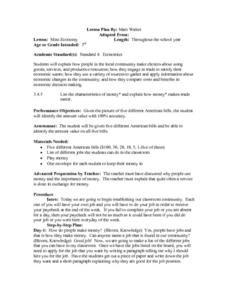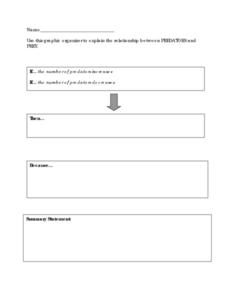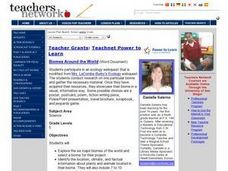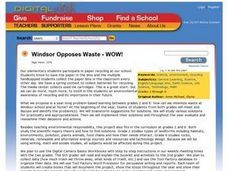Curated OER
Mini Economy
Fifth graders listen as the teacher explains the Mini Economy to be activated in the classroom in the next few weeks. They examine how they to apply for jobs, make money, determine how to save it, and how monetary mishaps occur...
Curated OER
Children's March Teacher's Guide, Activity 1
Students study how political movements involve students as well as adults. They discover that students of all ages have the power to make a difference in the world.
Curated OER
Tree Friends
Students are introduced to tree structure and use. They identify their special tree using all senses except sight. Students identify six different internal parts within a cross section of tree trunk (bark, phloem, xylem, cambium,...
Curated OER
Predators and Prey
Students explain how the food chain works. They contrast predators with prey and describe their function in nature. Students discuss how the food chain aids in keeping nature balanced. In small groups, they play a game that simulates the...
Curated OER
Microbes 1: What's Bugging You?
Students build on existing knowledge of microbes, focusing on the relationship between microorganisms and foodborne illness, as well as the implications that foodborne illness has on human health.
Curated OER
Sorting
Students study how things are stored and how information is retrieved. In this investigative lesson students play a game that helps them to see how things are sorted in a library.
Curated OER
Math Skills for Everyday: Filling Out Income Tax Forms
Students accurately assess their own income taxes using actual tax forms. They read and fill out the proper forms.
Curated OER
Developing Thinking and Reasoning Skills in Primary Learners Using Detective Fiction
Students are introduced to the genre of detective fiction. Based on their reading level, they are given a different series of books to read. For each story, they are to make predictions and practice decoding messages. To end the...
Curated OER
Scales, Scutes, and Skins
Students identify the various adaptations of reptiles and amphibians. After distinguishing between reptiles and amphibians, students discuss the ways in which their adaptations aid in their survival. They participate in a hands on...
Curated OER
Entrepreneurship: Planning to stay in business
Students write the last three sections of a business plan for their hypothetical business: the operation timetable, the start up costs, and the three-month projected statement.
Curated OER
Biomes Around The World
Fifth graders explore the six major biomes found in the world and choose one for further research and presentation. Using internet sources, they identify the major characteristics of their biome and synthesize their information into a...
Curated OER
Money Talks Canadian Money
Students use newspapers, games and journal writing activities to examine the importance of money and the role it plays in daily life. They complete several math problems, fill out worksheets and practice changing varying amounts.
Curated OER
Processing the Future: Innovations in Computer Technology
Learners visit a website that takes them inside of a computer to see how it works. They investigate the people who contributed to computer technology.
Curated OER
The Acoustics House
Young scholars study how drums produce sound by building and playing a simple drum. They measure the diameter of their can, then mark a circle two inches larger in diameter on their piece of plastic with the marker or chalk, and cut out...
Curated OER
How Many Ways Can You Represent a Number?
Students participate in monthly scaffolded lessons that focus on working with whole numbers from 1 to 10. They work with tiles on exploration mats, number tile mats, and a number representation book. Each month they complete activities...
Curated OER
Drawing Animals
Students draw animals using photographs and/or mounted animals. They apply details using shading techniques. They illustrate animals using geometric shapes.
Curated OER
The Right Chemistry
Learners see that chemistry is the study of matter, how matter reacts and combines to create new chemicals, the changes that take place in matter and what makes up matter. This lesson provides many good ideas across the curriculum to...
Curated OER
Windsor Opposes Waste - WOW!
Students participate in paper recycling. They are taught to environmental awareness of recycling and its importance in their future. Students discuss and identify the problems of how they can minimize waste. They brainstorm suggestions...
Curated OER
A Living Watershed
Students, through this series of lessons, use local resources, speakers, print and video materials, as well as standard text materials to study the ecosystem of the local watershed.
Curated OER
Adorable Snow Folks
Students create "Snow Folks" using children's mittens, rice, wooden balls, and various art materials in this Art lesson for grades Four and up. The lesson includes picture examples and suggestions for successful implementation of the...
Curated OER
Water Quality Monitoring
Learners comprehend the four parameters of water quality. They perform tests for salinity, dissolved oxygen, pH and clarity or turbidity. Students comprehend why scientists and environmental managers monitor water uality and aquatic...
Curated OER
How Many Months?
Students investigate the first Peter the Mint Eagle, who lived at the Philadelphia Mint from 1830 to 1836. They determine how many months Peter was there and use pictures, numbers, equations, and/or words to explain how they came up with...
Curated OER
Recent Trends in Family Life
In this Recent Trends in Family Life instructional activity, students respond to eight questions with short answers. Suggested point values are provided for responses.
Curated OER
Alternative Alphabet
Students determine and compare hieroglyph content and frequency to an alternative alphabet based on symbols that mimic sounds of the alphabet.

























